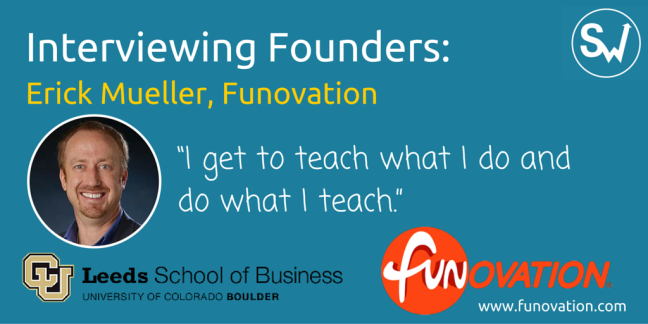This week, we had the pleasure to talk to Erick Mueller, Serial Entrepreneur, Co-Founder at Funovation, Adjunct Professor at the Leeds School Of Business, University of Colorado. We discussed entrepreneurial path, funding strategies and having a purpose.

Some of our favorite quotes from Eric:
‘The entrepreneurial mindset is helpful to anyone but not everyone is fit for this path. It is an unbelievably hard path so you need to be passionate and to enjoy that journey.’
‘I am excited to be a professor at CU: I get to give back and impact lives. I get to teach what I do and do what I teach.’
‘Raising money is not the challenge, growing is the challenge’
The interview can be found below:
What was your entrepreneurial path and what you’ve learned?
Erick – I’ve found 5 ventures, supporter 4 on their early stages – and all of them were in different industries. Today, everyone has access to information and this allows anyone to become an expert in anything in a month. There are 2 paths you can choose in your life: to be an industry expert or to be a domain expert. I chose the second path – being an expert with a specific skillset. So I became THE guy to commercialize anything in any industry. And what I learned about myself is that I am addicted to creating value. My biggest fear and drive is not to make an impact in the world using the talents and knowledge I am blessed with.
What are your thoughts on raising money for growing business?
Erick – I raised around $40-50 million in my career and decided not to raise any money for my last 3 ventures. Raising money is not the challenge, growing the business is the challenge. There is no reason to raise money for the sole purpose of raising money. There are 2 kinds of problems that take the most energy and time when you are building a business: 1) investor problem and 2) customer problem. I would rather have customer problem and deal directly with the customers. When raising capital, it is important to remember that venture capital is useful in growth stages, otherwise, on early stages, the cost of capital is too high. Bringing investors on board also usually shifts the culture of the business from impacting lives to making money. So what are the options out there? Grow your business from customer money (I did it with my last business). Having traction helps build relationships with banks and allows to get debt financing. Strategic partnerships is another option to consider – find partners who have vested interest in seeing your business grow. Last option is equity funding. Raising VC (or Vulture capital) money is the last resort – that is when you could lose the soul of the business.
In today’s crowded market, how can a business differentiate itself?
Erick – Biggest differentiation for business today is culture. We have access to information to build the business anywhere. But the emotional connection with customers based on what you stand for, having a purpose much greater than making money and fame is something that is hard to create. Another great differentiator is maintaining relationships with customers through customer experience: support, hand-written birthday cards, high-quality standards, etc. Mindshare with the customers is the key.
One important advice you would give an entrepreneur starting a business.
Erick – Being happy while building the venture. The most important question to ask is who you are going to work with: you need passionate, energized and experienced people. I’d personally rather collect trash with such people than work on the next unicorn with a bunch of jerks.

Check out Erick’s company www.funovation.com! Can you pass the laser maze?
